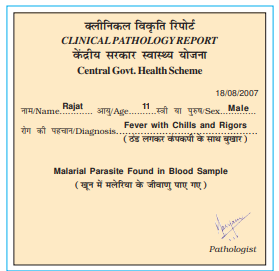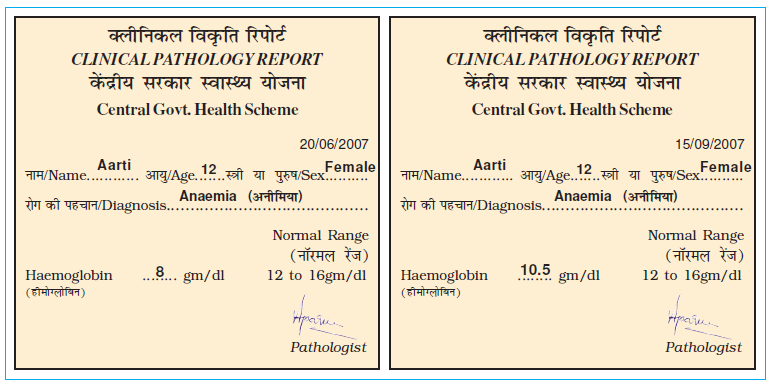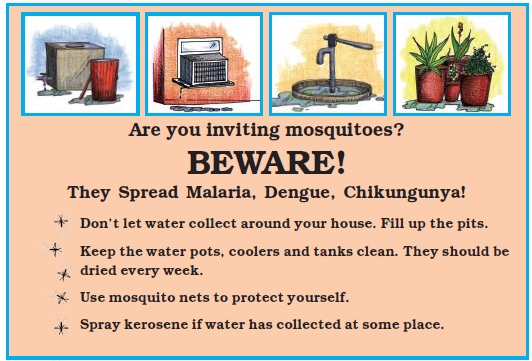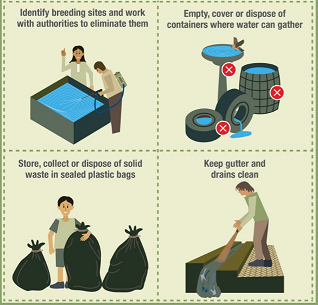NCERT Solutions Class 5 EVS book has 22 chapters. Chapter 8 – A Treat for Mosquitoes is a short summary of mosquitoes. The environment consists of everything around us. It can either be a non-living thing or a living thing. It includes natural resources and physical and chemical forces.
The Class 5 EVS, Chapter 8 – A Treat for Mosquitoes, briefs the students about the deadly disease malaria and helps them understand the importance of hygiene in and around us, as well as the precautionary measures to be followed.
Students can download the NCERT Solutions for Class 5 EVS Chapter 8, A Treat for Mosquitoes in the link below. To learn more about NCERT Solutions, click here.
NCERT Solutions for Class 5 EVS Chapter 8 A Treat for Mosquitoes
Access NCERT Solutions for Class 5 EVS Chapter 8
Q1. Do you know anyone who has had malaria?
Answer: Yes, malaria had once attacked my friend.
Q2. How did they find out that they had malaria?
Answer: By undergoing blood tests, they got to know it was malaria.
Q3. What problems did they have on having malaria?
Answer: My friend, when she was suffering from malaria, got a high fever and became too weak.
Q4. What other diseases can be caused by mosquito bites?
Answer: Through mosquito bites, we may get other diseases like chikungunya, yellow fever, dengue, etc.
Q5. In which season is malaria more common? Why do you think this happens?
Answer: Malaria is seen more commonly during the rainy season because that is the breeding time for mosquitoes.
Q6. What do you do in your house to protect yourself from mosquitoes? Also, find out from your friends about what they do.
Answer: The best thing to protect ourselves from mosquitoes is to use mosquito repellent.
My friends use mosquito nets, mosquito repellent cream, and also mosquito repellent coils.
Q7. Look at the report of the blood test given here. Which words in the report help us to know that the person has malaria?

Answer: In the report, it is clearly indicated that the malaria parasite found in the blood sample shows that the person is suffering from malaria.
Tell

Q1. Look at Aarti’s blood report and find out the minimum required haemoglobin.
Answer: By seeing Aarti’s blood report, the minimum required haemoglobin is 12 gm/dl.
Q2. How much did Aarti’s haemoglobin go up, and how long did it take for that?
Answer: By seeing Aarti’s blood report, haemoglobin increased by 2.5 gm/dl, which took almost 3 months to increase.
Q3. What does the newspaper report say about the problems caused by anaemia?
Answer: The newspaper report states that anaemia affects both the mental and physical health of a child. It causes problems in children’s growth, reducing their energy levels which in turn affects their education.
Q4. Have you or anyone in your family ever needed to get a blood test? When and why?
Answer: Yes, last month, when I was down with a fever, I got a blood test done. It resulted in malaria.
Q5. What was found out by the blood test?
Answer: By doing the blood test, we got to know that I was suffering from malaria.
Q6. Have you had a health checkup at your school? What did the doctor tell you?
Answer: Yes, we had a health check-up two months back at our school. The doctor told me that I was fit and fine.
Find out
Q1. Ask a doctor or elders about the food items which contain iron.
Answer: When I asked the doctor about the food items which contain iron, the doctor suggested that green leafy vegetables like spinach, cabbage etc., contain iron.
Find out and tell

Q1. Have you seen any poster like this put up anywhere?
Answer: Yes, these posters are usually put on school notice boards.
Q2. Who do you think puts up such posters or gives ads in the newspapers?
Answer: Government authorities may put up such posters or give ads in the newspapers; by doing so, they are providing information to the public.
Q3. What are some of the important points given in the poster?
Answer: The important points given in the poster are:
- Warning alerts regarding the diseases caused by mosquito bites.
- Fill up the pits, and don’t let water stagnate around your home.
- Every corner should be kept clean, and no moisture should be there so that mosquitoes don’t get to breed.
- Protect yourself from mosquitoes by using mosquito nets.
- Spray kerosene on the stagnant water and thereby reduce the further growth of mosquitoes.
Q4. Why do you think pictures of a tank, cooler and pits are shown in the poster?
Answer: In these areas, it is easy for mosquitoes to breed since water is stagnant at such places.
Think
Q1. Why do you think it talks about putting fish in the tank? What do you think the fish eats?
Answer: By putting the fish in the tank, it eats up the larva of mosquitoes so that there won’t be any breeding.
Q2. What will happen when oil is spread on the water?
Answer: When oil is poured into the water, it stops the oxygen supply to the mosquito’s larva from growing and kills them.
Find out
Q1. Which diseases are spread by flies and how?
Answer: Flies transmit pathogens via touch or from bodily fluids, including their saliva, faeces, vomit, and urine. They can transmit parasites or bacteria that cause various infections. The most common are amoebic dysentery, typhoid fever, cholera, Trachoma, tapeworm, roundworm, leprosy and mycoses.
Mosquito check
Q1. Divide your class into two or three groups. Each group will go around to check one area in the school or around it. It must carefully note if water has collected anywhere and mark ✓ where it finds stagnant water.
 Pot
Pot
 Cooler
Cooler
 Tank
Tank
 any open space in the school ground
any open space in the school ground
 Gutter
Gutter
 any other place_________.
any other place_________.
Answer:
Pot

Cooler

Tank

Any open space in the school ground

Gutter

Any other place
 – Drainage
– Drainage
Q2. Since how many days has water collected there?
Answer: The water has been collected there for almost a week.
Q3. Who is responsible for keeping these places clean?
Answer: At home, we are responsible for keeping the house clean. At school, the school authorities are responsible for maintaining the premises clean. Outside the premises, it’s the municipality’s responsibility to keep it clean.
Q4. Who is supposed to get the gutters and drains repaired?
Answer: The government municipality authority is supposed to get the gutters and drains repaired.
Q5. Can any larvae be seen in the collected water?
Answer: Yes, in the collected water, there could be larvae.
Q6. Has it caused any problems in the area?
Answer: Yes, the area being dirty makes it easy for the mosquitoes to breed. Hence, these mosquitoes have created a mess in the area overall.
Make a poster
Q1. In your group, make a poster with a message to keep the cooler, tank, drains, and the area clean (wherever water collects). Put up your poster in and around your school.
Answer:

Q2. Find out who is responsible for keeping the area around your school clean. Write a letter from your class, reporting your findings and suggestions. Find out to whom the letter should be written and to which office it should be sent.
Answer:
The local municipality is responsible for keeping the area around the school clean. So let us write the letter addressing the mayor and send the letter to the local Municipal Corporation Office.
To,
The Mayor
Municipal Corporation of Bangalore
Karnataka
Subject: Requesting for better cleanliness around the Vidyaniketan School premises.
Respected Sir/Madam,
We, the students of Vidyaniketan School, Bangalore, would like to bring to your notice regarding the dirt and garbage collected surrounding the school premises. The whole area is facing a mess from the mosquitoes breeding and diseases caused by them. Due to heavy rains, the water has been logged and caused this issue.
So, we request you to kindly look into the matter and resolve the problem at the earliest.
Thanking you,
Yours sincerely,
Student of Class V
Vidyaniketan School
Bangalore
Tell
Is there a pond or river around your house or school? Go and look around and observe these things:
Q1. Can you see algae in or around the water?
Answer: Yes, we can see algae formed in or around the water.
Q2. Where else have you seen algae?
Answer: We can see algae on damp walls, damp floors etc.
Q3. Are there plants growing on the side or in water? Find out their names. Draw some of these in your notebook.
Answer: Yes, there are plants which grow on the side or in the water, like mosses, liverworts etc.

Q4. Do you think these were planted by someone, or did they grow on their own?
Answer: No, these plants grow by themselves. There’s no need for someone to plant them.
Q5. What else can you see in the water? Make a list.
Answer: We can see fish, crabs, tortoises, etc., in the water.
What we have learnt
Q1. What can you do so that mosquitoes do not breed in your house, school and neighbourhood?
Answer: We have to avoid water logging, keep the surroundings clean, spray chemicals to prevent mosquitoes from breeding, use fish in water so that it prevents mosquito larvae from growing further, etc.
Q2. How can you find out if someone has malaria?
Answer: We can check if someone is having malaria if the blood reports show positive results of malaria.








Comments